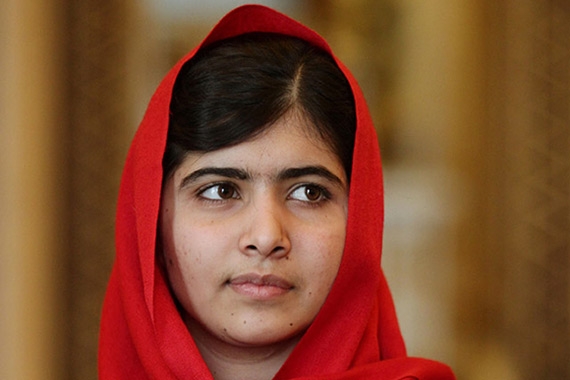
Malala was born in Mingora, Pakistan, located in the country’s Swat Valley. She became an advocate for girls’ education when she herself was still a child.
Malala attended a school that her father, Ziauddin Yousafzai, had founded. In September 2008, after the Taliban began attacking girls’ schools in Swat, she gave a speech in Peshawar, Pakistan. The title of her talk was, “How dare the Taliban take away my basic right to education?” She was 11 years old at the time.
Early the next year, she began blogging for the BBC about living under the Taliban’s threats to deny her an education. In order to hide her identity, she used the name Gul Makai. However, she was revealed to be the BBC blogger in December of that year. With a growing platform, Malala continued to speak out about her right, and the right of all women, to an education. This resulted in the Taliban issuing a death threat against her.
On October 9, 2012, 15-year-old Malala was shot in the head by a masked gunman while on her way home from school. She was critically wounded and transferred to Birmingham, England, for treatment. Malala required multiple surgeries, including repair of a facial nerve to repair the paralyzed left side of her face. Fortunately, she had suffered no brain damage.
The shooting resulted in a massive outpouring of support, which continued during her recovery. The Taliban still considers Malala a target, but she remains a staunch advocate for the power of education.
In 2013, nine months after being shot by the Taliban, Malala gave a speech at the United Nations. She said that “the terrorists thought that they would change our aims and stop our ambitions, but nothing changed in my life except this: Weakness, fear and hopelessness died. Strength, power and courage were born.”
Almost losing her life gave Malala “strength, power and courage.” That sounds a lot like Terry Fox when he announced how he had become more courageous and had stronger purpose after he lost his leg. Have you ever found you were spurred on to do something courageous when you experienced something of a critical nature?
You don’t have to lose a leg or be shot in the head, but if something so serious were to happen to you, you might realize how valuable life is. You’ll realize how you could use it to make a difference. Like Terry Fox, and like Malala, your life could become more purposeful—more meaningful. When we believe strongly in something, ready to give our all to it, it’s amazing what can be accomplished.
Are you in a crisis situation? Do you feel as though there’s no hope for you? Ask God to help you find a way to turn the bad into something good. Sometimes the worst situation can provide opportunities you would otherwise never have thought possible. Trust God and open yourself to his leading. You may be surprised where he’ll take you.
In 2014, at the age of 17, Malala became the youngest person to win the Nobel Peace Prize. Today, she continues to speak out on the importance of education.
This has been Part 18 of the series A Voice of One Calling. Read Part 19 Human Rights for All.
Leave a Reply